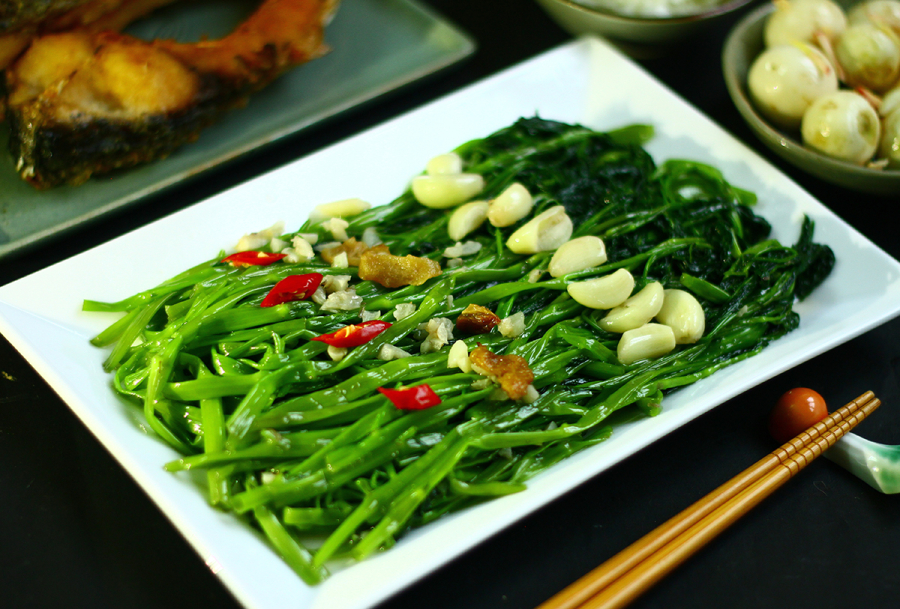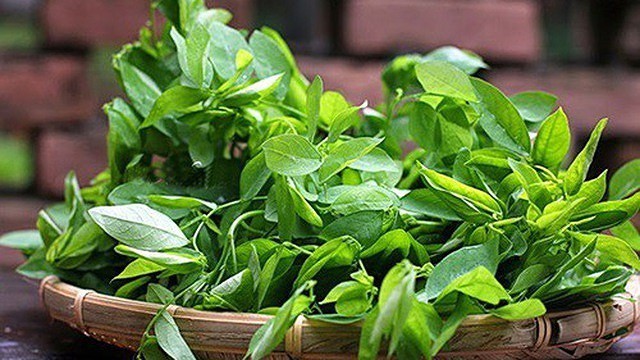Water Spinach: A Familiar and Nutritious Green Vegetable
Water spinach, belonging to the Convolvulaceae family, is a popular leafy vegetable in tropical and subtropical regions globally, especially in Vietnam. With the hot and humid climate of summer, water spinach is often grown abundantly during this season, becoming the main ingredient for dishes such as boiled and stir-fried water spinach, helping to cool down the body during hot days.
In traditional medicine, water spinach has a sweet taste and a slightly cold nature. It has cooling, diuretic, and detoxifying effects, helping the body fight against toxins from fungi or cassava. Modern medicine also highlights water spinach as an excellent source of water, vitamins A, B, and C, and essential minerals such as calcium and iron, contributing to nutritional supplementation and maintaining overall health.
Beneficial for Heart Health
Water spinach is rich in vitamin C, with 100g containing approximately 55mg of this vitamin, according to USDA data. Vitamin C not only boosts immunity but also has anti-aging and cardiovascular benefits. Additionally, water spinach is high in fiber, which helps lower cholesterol and neutral fat levels in the blood, reducing the risk of heart disease.
Blood Sugar Control
Another notable aspect of water spinach is its ability to regulate blood sugar levels. This vegetable contains nitrates, compounds that help stabilize blood sugar. Research has shown that water spinach can slow down carbohydrate digestion while enhancing resistance to oxidative stress, a factor contributing to various chronic illnesses. This is particularly advantageous for individuals with diabetes or at high risk of developing it.

Water spinach’s ability to regulate blood sugar levels is noteworthy.
Aids Digestion
Water spinach is also known for its mild laxative properties, improving digestion and relieving symptoms of indigestion and constipation. The high water and fiber content in water spinach facilitate smoother digestion, ensuring the digestive system functions efficiently.
Promotes Eye Health
Water spinach is abundant in vitamin A and lutein, two essential nutrients for eye health. Vitamin A is necessary for maintaining good vision and preventing eye diseases such as cataracts. Lutein, a type of carotenoid, also plays a crucial role in protecting the eyes from the harmful effects of blue light and free radicals.
Prevents Anemia
With its high iron content, water spinach is an ideal food to prevent anemia. Iron is essential for producing hemoglobin, which carries oxygen in the blood. This is particularly important for women during menstruation, when the risk of anemia increases, and it is also beneficial for pregnant women. Iron from water spinach helps alleviate menstrual pain and supports the overall health of mothers and their babies.

Water spinach, with its high iron content, is ideal for preventing anemia.
Health Benefits of Rice Paddy Herb
Rice paddy herb, also known as lacinato kale or sweet basil, is a vegetable that not only helps cool down during hot summer days but also offers numerous health benefits. In traditional medicine, rice paddy herb leaves have a sweet and nutty flavor with a cooling effect, while the roots have a slightly bitter taste. Both the leaves and roots of the rice paddy herb have medicinal properties, including cooling the blood, promoting blood circulation, diuretic, detoxifying, laxative, and anti-inflammatory effects.
Scientific studies have shown that rice paddy herb is nutrient-rich, containing plant-based protein, calcium, iron, magnesium, manganese, and various vitamins such as vitamins A and C. Notably, the vitamin C content in 100g of rice paddy herb can range from 85-185mg, depending on the preparation method. Vitamin C not only has anti-aging properties but also boosts immunity and protects the body from diseases.
Helps Lower Blood Sugar
Research has proven that rice paddy herb effectively lowers blood sugar due to its inulin content, a type of soluble fiber. Inulin slows down the absorption of sugar from carbohydrates, thereby aiding in the prevention of type 2 diabetes.
Benefits for Postpartum Women
Rice paddy herb is especially beneficial for postpartum women. Due to the presence of chemical compounds called sterols, which have estrogen-like properties, rice paddy herb helps reduce inflammation and stimulates the production of breast milk, playing a crucial role in postpartum care.
Laxative Effect
Rice paddy herb is well-known for its laxative effect due to its high fiber and water content. This helps improve digestion and reduces constipation.
Eye Health
Rice paddy herb is rich in provitamin A, playing a vital role in maintaining eye health. Regular consumption of rice paddy herb can help prevent eye diseases, especially age-related issues such as macular degeneration.

Rice paddy herb, rich in provitamin A, is essential for eye health.
Precautions when Consuming Water Spinach and Rice Paddy Herb
Preserve Vitamin C
Vitamin C in rice paddy herb and water spinach can be lost if the vegetables are bruised or improperly prepared, such as by adding too much salt or overcooking. To retain their nutritional value, choose fresh bunches, use minimal seasoning, and cook them just enough, either by steaming or boiling.
Food Safety
Ensure you thoroughly wash the vegetables multiple times with clean water and soak them to reduce any chemical residue. Cooking the vegetables thoroughly is also an effective way to prevent parasitic infections.
Proper Consumption
Avoid consuming rice paddy herb and water spinach continuously for many days to prevent side effects like indigestion and insomnia. Moderate and sensible consumption will allow you to maximize the health benefits offered by these two vegetables.





































